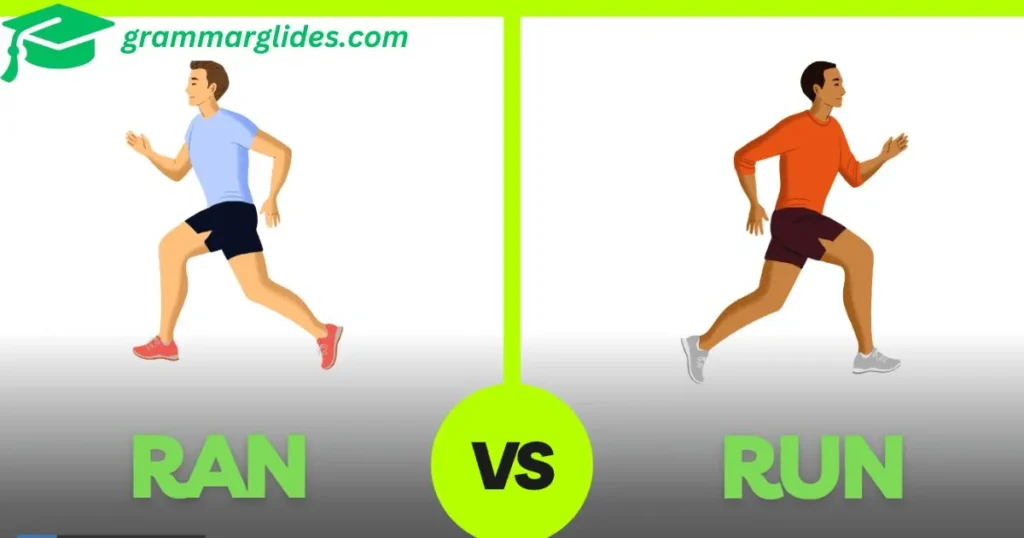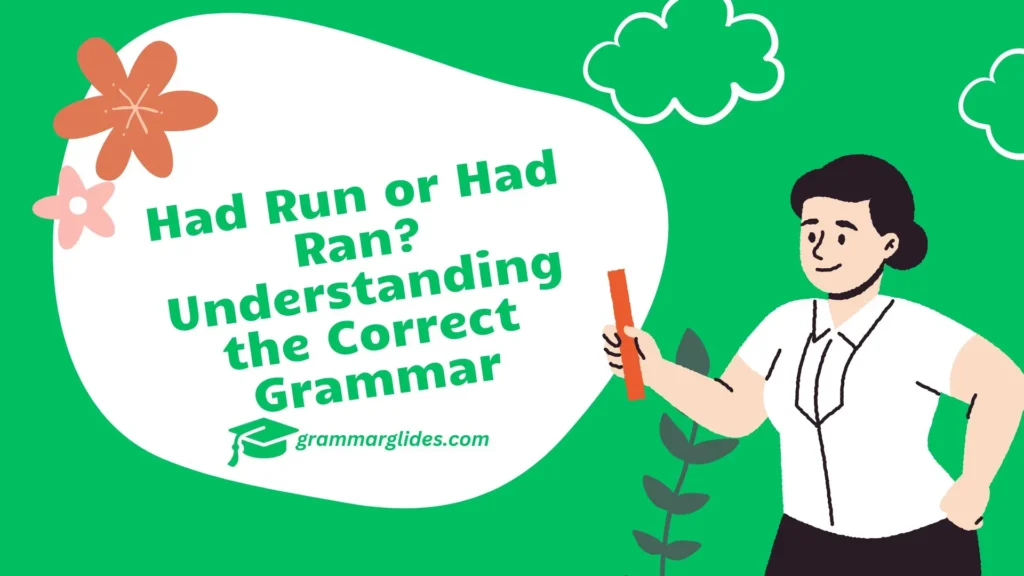“Master the difference between ‘had run’ and ‘had ran’ to elevate your grammar game effortlessly!”
The English language can sometimes puzzle learners and even native speakers with its intricacies. Among the common confusions is choosing between “had run” and “had ran” in past perfect tense structures. Understanding this difference is crucial for improving your grammar and communication skills. This article dives deep into the correct usage, form, and practical examples to make your learning process easier and more relatable.
If you’re writing professionally, casually conversing, or preparing for an English exam, getting your verb forms right is an essential step. This guide is designed to provide clarity and practical knowledge you can apply immediately.
When it comes to verb usage, understanding terms like “base form,” “simple past,” and “past participle” is key. These concepts form the foundation for using verbs correctly in sentences, especially when constructing past perfect tense phrases. Let’s explore these elements in detail and uncover their correct application.
Overview: “Had Run or Had Ran?
This blog post unpacks the common grammatical confusion between “had run” and “had ran.” Starting with a bold, italicized snippet that emphasizes the importance of mastering these forms, the introduction outlines the significance of using proper verb tenses, followed by a call to action encouraging readers to refine their grammar. It also provides foundational information about verb forms, focusing on their role in constructing correct sentences.
Understanding Verb Tenses
Verb tenses allow us to describe when an action occurs. The past perfect tense, in particular, is used to express an action that was completed before another action or point in the past. For example:
- Correct: She had run five miles before breakfast.
- Incorrect: She had ran five miles before breakfast.
Past Perfect Tense
The past perfect tense combines the auxiliary verb “had” with the past participle of the main verb. It indicates actions that were completed before another past event.
Formation of the Past Perfect Tense
To form the past perfect tense, follow this structure:
- Subject + had + past participle of the main verb.
Examples:
- He had run the marathon before noon.
- They had completed their homework before the class started.
- By the time we arrived, she had left the party.
“Run” vs. “Ran”: Verb Forms

Base Form
The base form of a verb is its simplest form without any suffixes or changes. For example: run, eat, play.
Simple Past Form
The simple past form of “run” is ran. Example:
- Yesterday, I ran three miles.
Past Participle Form
The past participle form of “run” is run. Example:
- She has run a successful business for years.
How Does It Work or How It Works? Clarifying the Difference
Comparison Table
| Verb Form | Run | Ran |
| Base Form | Run | Not Applicable |
| Simple Past | Not Applicable | Ran |
| Past Participle | Run | Not Applicable |
Correct Usage: “Had Run”
Explanation
“Had run” is the correct form in the past perfect tense because “run” is the past participle of the verb.
Sentence Examples
- By the time the coach arrived, the team had run out of ideas.
- She had run her errands before the storm started.
- We had run several simulations before presenting our findings.
Common Mistakes
Incorrect Usage: “Had Ran”

Explanation
“Had ran” is grammatically incorrect because “ran” is the simple past form, not the past participle. It cannot be used with “had” in past perfect structures.
Sentence Examples
- Incorrect: The child had ran to the park before we arrived.
- Incorrect: By evening, she had ran five miles.
- Incorrect: They had ran out of supplies before we got there.
Analysis of Misconceptions
The confusion often arises because people mistakenly equate the simple past form (ran) with the past participle (run). Remember: “had” always pairs with the past participle, not the simple past form.
Tips for Remembering Correct Forms
Mnemonic Devices
- Had = Run: Think of it as “Had already run its course.”
- “Run after had, not ran.”
Practice Exercises
- By the time the sun set, they had _____ the race.
- She had _____ all her errands by noon.
- He _____ faster yesterday than today.
Answers:
- run
- run
- ran
Resources for Further Learning
- Online Grammar Tools: Websites like Grammarly and Hemingway can identify incorrect verb usage.
- Reference Books: “English Grammar in Use” by Raymond Murphy is a fantastic guide.
- Language Apps: Apps like Duolingo and Babbel provide interactive exercises on verb tenses.
Common Questions and Confusions
1. Can I ever use “had ran”?
No, “had ran” is incorrect. Always use “had run” with the past perfect tense.
2. What is the simple past tense of “run”?
The simple past tense of “run” is “ran.”
3. Is “run” ever used in present tense?
Yes, the base form “run” is used in present tense. Example: I run every morning.
4. How can I practice using the correct forms?
Practice by constructing sentences and checking your answers against grammar guides.
5. What are other tricky verb forms to watch out for?
Common ones include: see/saw/seen, write/wrote/written, and eat/ate/eaten.
Wrap-Up
Mastering grammar takes patience, but focusing on fundamental concepts like verb tenses can make all the difference. “Had run” is the correct phrase to use in past perfect tense because it aligns with the rule that past participles follow “had.” Understanding why “had ran” is incorrect helps clarify the nuances of verb usage. Remember, learning is an ongoing journey—practice daily, seek guidance from trusted resources, and experiment with sentence creation. With time, you’ll confidently express yourself with grammatical accuracy, leaving no room for errors!

Hi! I’m Lauren Reynolds, the author of Grammar Glides. I create easy-to-follow content that helps you master English with confidence. Let’s make learning English simple and enjoyable together!

